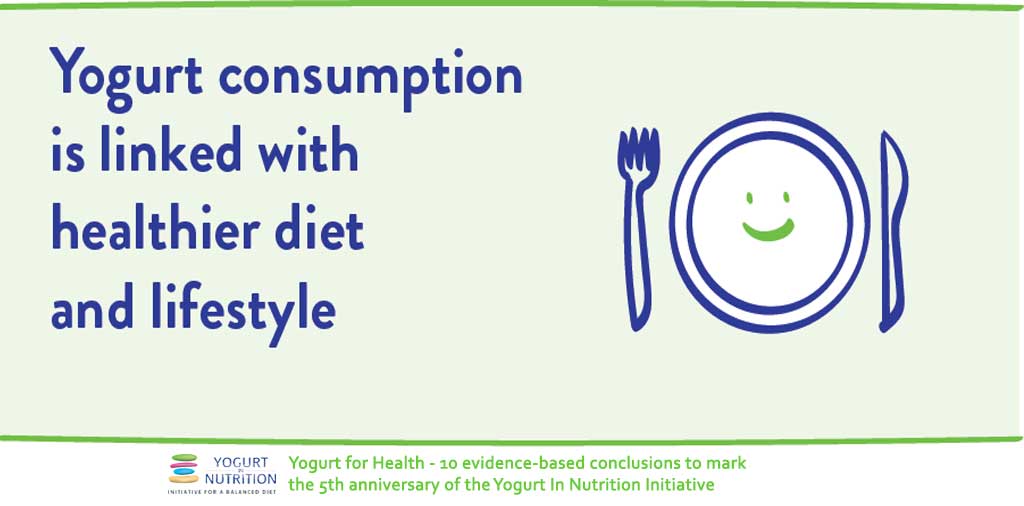“Yogurt consumption is linked with healthier diet ” is one is one of the 10 evidence-based conclusions made by the YINI board about the health effects of yogurt… learn more below
Regular yogurt consumers of all ages tend to eat and live healthily. They are less likely to consume junk foods, or smoke or drink alcohol to excess, and are more likely to exercise regularly.
Yogurt consumers are more likely to have adequate intakes of key nutrients
- Yogurt consumers are less likely than nonconsumers to have an inadequate intake of certain vitamins and minerals, including vitamin B2, B12, calcium, magnesium and zinc.
> Learn more about the study: Yogurt consumtion associated with a better diet quality and metabolic profile
- In both children and adults (in Spain and the USA), swapping high-calorie, nutrient-poor snacks for fullfat yogurt with fruit could help boost key nutrients and improve dietary quality without contributing to dietary excess and obesity.
> Yogurt and fruits: the winning combination
> Find here through this infographic why yogurt is a great snack for children
- In French adults, rebalancing dairy intake to favour low energy-dense dairy products (milk and yogurt rather than cheese) can help improve dietary nutrient density without increasing calories or less desirable nutrients.
> Discover more about how yogurt does fit in nutritionally adequate diet.
References:
-
Wang H, Livingston KA, Fox CS, et al. Yogurt consumption is associated with better diet quality and metabolic profile in American men and women. Nutr Res 2013;33:18–26.
-
Fernandez MA, Marette A. Potential health benefits of combining yogurt and fruits based on their probiotic and prebiotic properties. Adv Nutr 2017;8:155S–64S.
-
Hess J, Slavin J. Snacking for a cause: nutritional insufficiencies and excesses of U.S. children, a critical review of food consumption patterns and macronutrient and micronutrient intake of U.S. children. Nutrients 2014;6:4750–9.
-
Clerfeuille E, Maillot M, Verger EO et al. Dairy products: how they fit in nutritionally adequate diets. J Acad Nutr Diet 2013;113:950–6.
-
Panahi S, Fernandez MA, Marette A et al. Yogurt, diet quality and lifestyle factors. Eur J Clin Nutr 2017;71:573–9.
-
Cormier H, Thifault É, Garneau V, et al. Association between yogurt consumption, dietary patterns, and cardio-metabolic risk factors. Eur J Nutr 2016;55:577–87.
-
Possa G. Corrente JE, Fisberg M. Yogurt consumption is associated with a better lifestyle in Brazilian population. BMC Nutrition 2017;3:29.
-
Possa G, de Castro MA, Marchioni DM, et al. Probability and amounts of yogurt intake are differently affected by sociodemographic, economic, and lifestyle factors in adults and the elderly – results from a population-based study.
Nutr Res 2015;35:700–6. -
D’Addezio L, Mistura L, Sette S, et al. Sociodemographic and lifestyle characteristics of yogurt consumers in Italy: results from the INRAN-SCAI 2005–06 survey. Mediterranean Journal of Nutrition and Metabolism 2015;8: 119–29.



